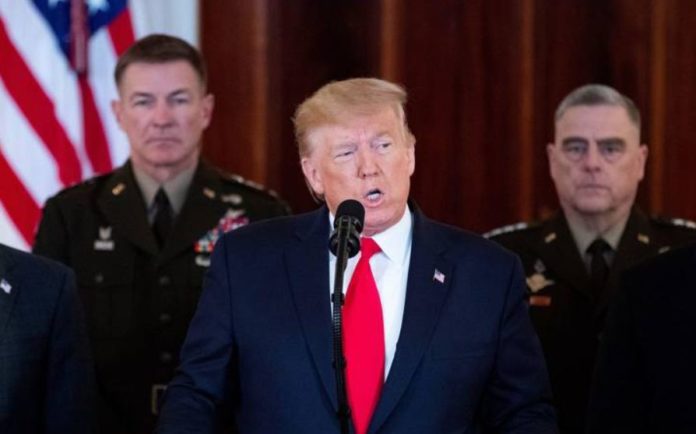Trump’s words were not only backed by army aircraft and missiles, but also by an economy in a state of grace and large oil reserves
“Iran seems to be lowering its tone, which is good for all parties involved and very good for the world,” said Donald Trump, president of the United States, in his address on tensions in the Middle East. In this succinct way, he indicated the most important thing: that the United States will not respond, for the moment, to the 22 missiles that Iran launched on two bases in Iraq with US personnel and that they did not leave victims. The climb, for now, could be over.
Instead of bombing Iran, as the president shuffled this weekend, the White House will opt for a much safer mechanism from the American point of view: it will impose new sanctions. It will further pressure a country that has already been isolated from international markets, foreign investment and the technology required to exploit its formidable hydrocarbon reserves.
Trump’s words were not only backed by the aircraft carriers and missiles of the world’s most powerful army, but also by an economy in a state of grace; an economy that, in addition, no longer feels on his head the sword of Damocles that the price of oil has always meant for American capitalism. In the event of a conflict, the Trump administration has much less to lose, at least economically, than any of its predecessors.
The oil tap, open
When the OPEC cartel closed the oil tap to the United States and other allies of Israel during the Yom Kippur war in 1973, it was actually being the midwife of a new economic and geopolitical era. The thriving western middle class resented, having to increase their spending on fuel; companies, overwhelmed by rising costs, began to move to poorer countries; The technological revolution accelerated and, since then, US presidents have been focused on securing Middle Eastern oil.
This dynamic, still in force and embodied by the strong friendship between Washington and Saudi Arabia, or by the endless Gulf wars, has begun to change. Last November the United States became a net exporter of crude oil for the first time in its history. Hydraulic fracturing techniques have allowed almost triple the daily production of American barrels since 2008.
The energy muscle has allowed keeping the price low and also relieve the economic burden of businesses and families. In 1970, the average American invested less than 8% of his budget on gasoline; A decade later, as a result of part of the OPEC embargo, spending had risen to 13%. According to 2017 data, this invoice has dropped to less than half: 5.8%.
The Middle East may be on the verge of its nth cataclysm, but these days when several governments held their breath, the American consumer failed to pay more than $ 3 per gallon of fuel. As if nothing had happened. Wall Street indexes, once so sensitive to the barrel, have swung back and forth without passing the point, almost as in any other week.
No effect at the gas station
“The US oil boom is the main reason why no one is seriously envisioning three-digit oil prices, even with everything that is happening,” said Ashley Petersen, an analyst at Stratas Advisors, on the Axios portal. Last year’s incidents, such as the bombing of Saudi refineries, which reduced the global supply of crude oil by 5% or the kidnapping of oil tankers in the Strait of Hormuz, had an ephemeral impact on the price of the barrel.
Not only does the United States enjoy this safeguard; Iran’s economy, and with it, the margin of manoeuvre of its government and the delicate tempers in the streets is severely damaged. If you look at the calendar of the last four years, you will see a close relationship between US sanctions and Persian economic performance.
In 2015, Iranian President Hasan Rohani signed the battered nuclear agreement with the US and five other powers today. In exchange for limiting its nuclear activities, many of the sanctions applied to Iran were lifted. In 2016 the Iranian economy was propelled by 12.3%. Its oil returned to the markets, outside companies studied opportunities and more and more foreign tourists came to visit one of the most powerful and fascinating cultural heritage in the world.
The Persians, in free fall
In 2018, however, Trump’s White House broke out of the agreement and progressively reimposed sanctions. The Iranian economy fell to -4.8% that year and -9.5% in 2019, according to data from the International Monetary Fund. The Iranian currency, the rial, has again become a stink and inflation has decimated the shy middle class of the Islamic country. Inflation in 2019 has reached 40% monthly, has eaten wages and the price of housing has doubled in the last year.
As Josh Barro explains in The Intelligencer, “in a landscape more than the style of the seventies, President Trump could have been reluctant to shake the Middle East with an attack like the one that killed Soleimani, for fear of what a military escalation in the region could make the oil trade, the price of gasoline, and its prospects for re-election”. But the United States, and its presidency, enjoy a new economic shield. A shield that also lowers the cost of war.
